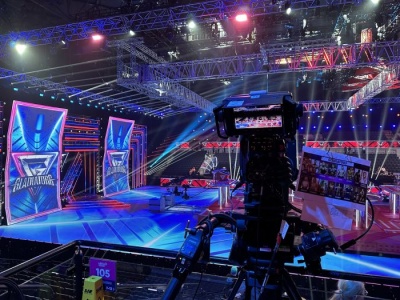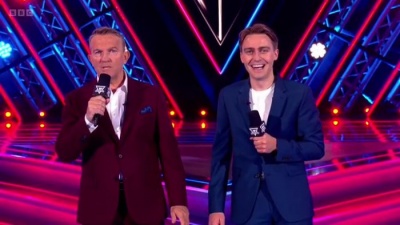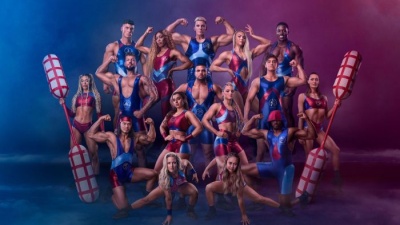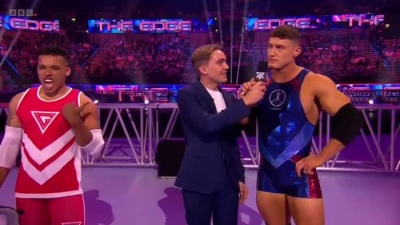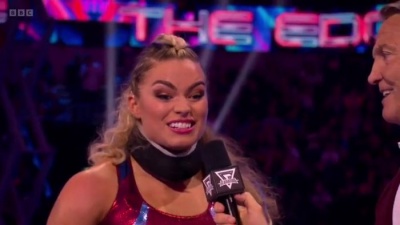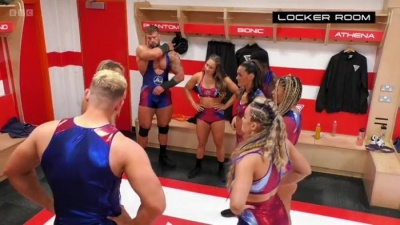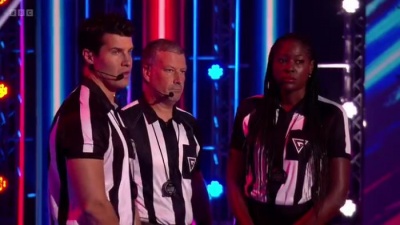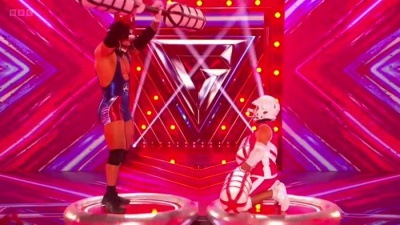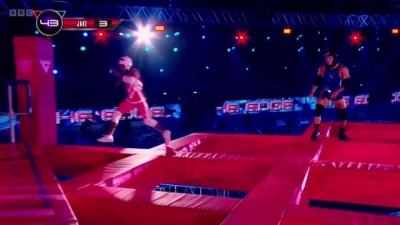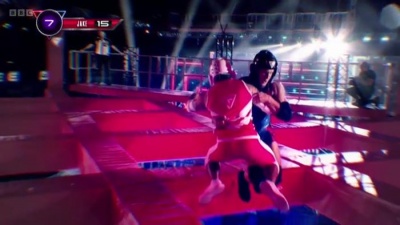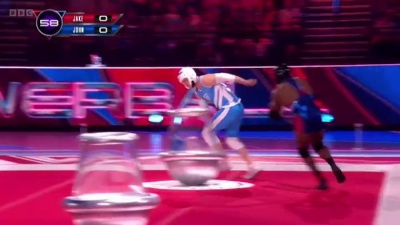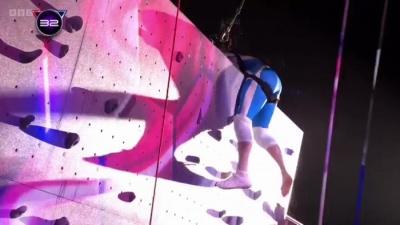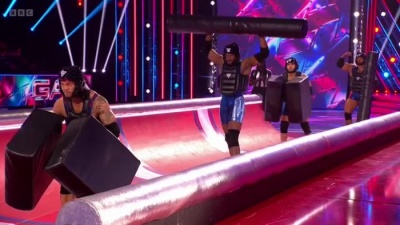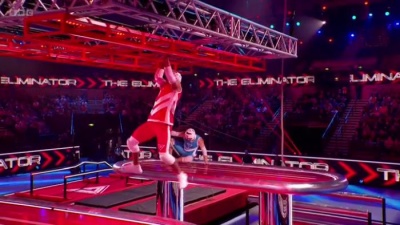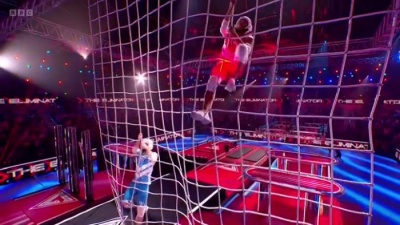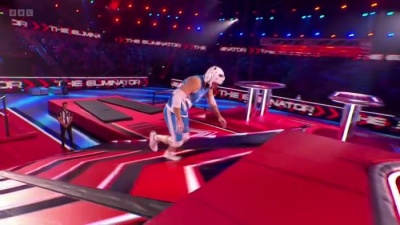Weaver's Week 2024-03-03
Last week | Weaver's Week Index | Next week
"Everyone's got a plan until they get hit in the face with a pugil stick."
Contents |
Gladiators
Hungry Bear Media / MGM Alternative for BBC1, from 13 January
Gladiators is an integral part of the 1990s, and it all began with an import. American Gladiators was an unexpected success on overnight telly during 1991, impressing its audience of shift-workers, students, and drunk people coming home from the pub. None of them would take part: it was a show where super-fit contenders took on even fitter spoilers. The key ingredient: Gladiators was always family entertainment for everyone rather than sports for sports fans. LWT were convinced to make one series, which was a success, then more easily convinced to make another.
For a few years in the mid-90s, Gladiators became an absolute phenomenon – it made a household name out of John Fashanu, it turned contender Eunice Huthart into Hollywood's favourite stuntwoman, it set Wolf and Jet and the others up for life. There were international series, and huge ratings, and it was front page news when Shadow got fired for taking performance-enhancing drugs. LWT left the audience wanting more, and finished the series in 1999.
And now, a quarter of a century after it last appeared on television, Gladiators is back! What's changed, what's the same, what works, and what doesn't?
Who are these people?
Our hosts are Barney Walsh and Bradley Walsh, his son. Barney is a familiar face from shows like Blankety Blank, Take Off, and ITV's daytime smash Spin Star. Bradley has been promoted as his father's sidekick on travel shows like Barney and Bradley Conquer Canada.
The original Gladiators had the familiar and sensible Ulrika Jonsson, and a sports star – John Fashanu for most of the series, then Jeremy Guscott after Fash got caught up in Grobbelgaate (©WSC 1994). A mixture of light and shade is essential to the show, and while Barney is reasonably sensible and wants to get on with the programme, Bradley is prone to flights of fancy and very bad puns. It keeps the smiles up and the programme moving.
Another change in personnel is the Gladiators themselves. The original group are now in their 50s and 60s, and are not cut out for extreme physical activity. They're replaced by a lot of characters – perhaps too many new characters, as we've barely got our head around more than a few of them.
Still, the bigger characters are entertaining. Legend positioned himself top-left in all the photoshoots, so he'd always be the number one, and Legend has an ego so large that can be seen from outer space. Giant is h-u-g-e, a body so large that it can be seen from outer space. Viper might have been the one they wanted to promote as the new Wolf, anything he lacks in size he more than makes up in cunning – but he's not yet hit the pantomime villain notes as well as the big doofus Legend.
Amongst the women, Fury is a ball of focussed rage every time she is called into action. Dynamite slips through the smallest of cracks like liquid mercury, and Athena gets to carry herself like the Greek deity. With the exception of Viper and Legend, all of the Gladiators respect their opposition, and are quick to praise when they've been given a tough match.
Looking back at our notes from the first couple of series, it took well into series two to get a handle on most of the OG Glads. We're not worried that we haven't got anything to say about Steel or Comet, that will come in time, once we've spent more time marvelling at their abilities.
One new idea for this run is a set of cameras in "the Gladiators locker room", an area backstage where the Glads hang out, always in costume. We see them just after their matches, still on the adrenalin buzz from being out on stage. There's no doubt that these shots are selected, and we would not raise eyebrows to find that they're scripted. None of this is a problem: the locker room moments have their use, they help to establish each Gladiator's personality, reinforce their character – and the values the show wants to put across.
The BBC version of Gladiators goes out on the BBC, where there are no commercials. The ITV version was on ITV, where there are adverts. Both shows run for an hour, which means the BBC show has to find an extra ten minutes of proper programme. How do they do it? Little things: there's a short introduction and a video package to explain each event from Barney and Brad, rather than the commentator saying "On to event four, Gauntlet". Those clips from the locker room are new, and the interviews with contenders after the event are just that little bit longer. And there seems to be more larking about from the Glads, moments where they're being silly. The Beeb have found their extra ten minutes in teeny-tiny slices, the show runs a little bit slower than in the 1990s, but you'd need to sit down with a stopwatch and spreadsheet to work out exactly where.
John Anderson is still alive, we're pleased to say, though at 92 years of age we are not surprised that the head referee declined the opportunity to return. Mark Clattenburg picks up the golden whistle, he's tough but fair, and explains his decisions excellently for the competitors and viewers. His assistants are Sonia Mkoloma (a former netball international) and Lee Phillips (fitness professional), they are not miked up for the viewer's benefit.
Mark has retained the traditional "three – two – one – pheep!" countdown. With the advances in technology, the countdown is also shown on big screens around the arena – but this is often out of sync with what Mark is shouting. More concerningly, on many occasions people seem to have started moving before the whistle blows. We can understand why the countdown visuals might be out of sync, they're more for the arena than us at home; but we do need the whistle to coincide with the players starting their game. Definitely an area they can improve for the next series.
Game on!
At the heart of Gladiators is the games. The challenges. Contender versus Gladiator, in the toughest fight since Grange Hill vs St Josephs.
Duel started the series. For those of us who remember the original, it was five fantastic minutes. The original spiky-G logo! Profiles of the Gladiators set to a remix of the original theme! Two contenders, and then straight into the big one. Contender. Gladiator. Big podium. Massive oversized cotton wool bud. And they're going to smash each other to kingdom come, using that oversized cotton wool bud. It is the ultimate memory, something shared by anyone who remembers the 1990s.
They've played Duel every week, and we can understand why. It is the ultimate hook, something everyone remembers. And it's a very simple game to understand, and a very simple game to film: just focus on the action from lots of angles, and choose the best in the edit afterwards. Duel is hard, ferocious, and played at a tremendous pace. Welcome back.
Collision is the first of the new games. It's loosely based on "Suspension Bridge" from the classic series, the one where contenders cross a flimsy bridge while avoiding big squidgy balls being flung by the Gladiators. For this new game, the big squidgy balls are replaced by the Gladiators, flailing muscular humans who try to knock the contender off.
We're very pleased to see that the Gladiators keep their feet together, because if the flailing turning into kicking that would be incredibly dangerous. Just as in the 1990s, Gladiators doesn't want to expose anyone to avoidable harm, and certainly doesn't want to show behaviour that children might copy in the playground. Kicking out to the face, that wasn't cool in 1992, it's not cool in 2024.
The Edge seems to alternate with Collision. It's loosely based on The Vortex from The Adventure Game, the one where Noel Edmonds tried to cross a diamond-shaped grid armed with nothing more than his wit and a half-eaten green cheese roll. For this version, the role of The Vortex is played by the Gladiator, and their aim is not to zap the contender all the way to Rickmansworth, but to push them off the edge of The Edge. Or down one of the holes in the middle of The Edge.
Played above the arena floor, we get a spectacular slow-mo sequence whenever someone falls off the edge and into the abyss below. It seems to be a more tactical game, with more than a little standing around by Gladiator and contender alike, feinting until one makes a mistake. Gladiators is about physical strength, but there's a mental side, and The Edge brings it out.
Hang Tough is another physical-and-mental game, players traverse a forest of chains with rings hanging from the bottom. Their aim is to go from their side to the Gladiator's side without being knocked off, or survive in the further half of the arena until a minute has expired. Another game first seen in the original Gladiators series, and explained by event commentator Guy Mowbray. His commentary started out a bit stat-heavy, but very nearly perfect from day one; light years ahead of Joel on Survivor. He's carving out a niche for himself, a little wit and a lot of charm, and we need to remember that OG commentator John Sachs took a couple of series to develop his sass.
For production reasons, we only see one of The Edge and Hang Tough in any show – they won't rig the ceiling for both games.
Powerball and The Ring are another pair that never appear together. Powerball is a simple mission: collect a ball, deposit it in some baskets, while avoiding crunching tackles from three Gladiators. The Ring is new, run from the outside of a circle to touch the button in the middle, while avoiding a tackle from one Gladiator sent to mark you and you alone. Both are hard, sinewy, tests of power and strength and endurance.
The Wall is back. Get from the bottom of the wall to the top, and don't get caught by the Gladiator breathing down your neck. Oh, and if you have shoes, make sure to tie them very loosely – every single time they play The Wall, one of the Gladiators catches up with a contender, grabs their shoe – and then the shoe comes off and the Glad falls and the contender reaches the top. We're going to chalk that down to bad training from the Glads, who need to be a bit higher on the contender before grabbing.
...but we must also chalk it down to the low height of The Wall. Gladiators is now filmed at the Sheffield Arena, not at the Indoor Arena in Birmingham. The Sheffield Arena is a shorter building, and they're only able to fit in a 10 metre wall; Birmingham's Arena allowed a 12 metre wall. Because The Wall is a test of strength and precision, they have to have it go pretty much straight up, and can't really have the course go at an angle. So the new wall is limited, and the event is somewhat faster, and even though they've cut head-starts down as far as they can go, it's not as good as it could be.
Gauntlet also returned. Four zones, each with a Gladiator: two with pressure pads, two with foam poles held across their body. Power past the Gladiator to reach the end and pick up lots of points, or a couple for each zone cleared.
Compared with the 90s, the course is much wider – there's no danger of tipping a contender out of the chute, but that leaves plenty of room to ease past without much interference from the Gladiator. And – with just four combats, rather than five – Gauntlet is often over in no time at all. For our money, this game isn't working, and will need a re-think if it's to come back next year.
Five of these eight events are played in each episode. For an 11-episode series, it's just enough variety to keep things different, just familiar enough that we're never stranded in "What Is Happening?!" land. A ninth game – Battle Bridge – is reported to have been tested – it looks like it was basically Duel played on the bridge from Collision, and played with just one long rod.
Being a picky so-and-so, this column is not impressed with cuts to the crowd during competition: are they hiding something from us? But then, we're not impressed when F1 do it during their live race broadcasts, and they've got no chance to correct in the edit.
One thing we're not impressed with: the in-game music. Ambient noodlings, we'd almost be better off without it. Especially in the Eliminator – give us power chords or give us cheering.
The Eliminator is back, and almost unchanged from the late 90s classic. Hurdles: high, low, high. Rope climb, then a hand ladder to cross. A trapeze swing (do remember to unclip the swing), then jump into the cargo net. Climb up the cargo net, then along to a zip wire back down to the arena floor. Then it's a balance beam – now with a zigzag section near the start – before the iconic Travelator and paper burst.
So they begin with a familiar event, they end with a familiar event, and they take us on a journey in the middle. Over the course of the hour, we get to know the contender pretty well. We'll cheer for our favourites, we might gently root against the one we don't like, but if they win through we'll barrack for them in the next round.
And the producers know we'll watch the next round. Gladiators is a series, meant to be watched in order. Five heats, with the fastest runner-up returning with the champion men and women. Three second-round matches, again the fastest loser returns. Then the semi-finals and final, straight knockouts from here.
Overall, they have done themselves proud on Gladiators. Look at the other recent revivals: Wheel of Fortune is clearly worse, Survivor didn't hit home, Jeopardy! was "merely" good. For Gladiators to live up to most people's expectations is an achievement. Viewing figures were phenomenal – over six million saw the first episode in mid-January, and figures have remained above 4 million on the night. It's a huge success, and a case of when – not if – they decide to order a new series. We hope for more events, we hope for events that better fit the arena (because goodness knows Gauntlet doesn't), and we hope for more brave and strong contenders to take on the Gladiators.
In other news
Dave Myers has died, aged 66. In his early life as a make-up specialist, he suggested Adam Ant paint his face with a white stripe. Alongside Si King, he was half of The Hairy Bikers, a pair of leather-clad motorcycle demons who love nothing more than a good bit of local cookery. Nothing like subverting the traditional expectations of motorbikes and masculinity. Over a twenty-year span, the Hairies became familiar faces, and gravitated towards cookery-with-a-dash-of-competition shows Food Tour of Britain and later The Hairy Bikers' Cook Off. Dave took part in Strictly Come Dancing in 2013, with more enthusiasm and success. Dave died of cancer; he leaves wife Liliana and two stepchildren.
How do they do those hidden camera stunts? Like the ones with Simon Cowell stopped on his bike on last week's Saturday Night Takeaway, or the Blue Peter VIP surprises? Thomas Stark Holland is one of the best riggers in the business – shows like Make My Day Off Their Rockers, and Meet the Humans. He shared his knowledge – and a discarded chicken curry – with the TV Show and Tell Podcast.
...it is now Back in the 1990s, the BBC tried a sports-related version of Have I Got News for You. Entitled They Think it's All Over, and hosted by Des Lynam, the topical panel show brightened up Radio 5 quite nicely. There was an inevitable transfer to television, losing the topical element and replacing Des with Nick Hancock. Why do we cover this old ground? We hear the cry, "Let's do a sports version of Have I Got News for You," without memory that we've done it before. Still, if Have I Got Sports for You gets Gary Lineker into real power, we're in favour.
Coming out in Belfast? Alex McMillan, a classy writer on quizzes like The 1% Club, Only Connect, and The Wheel, is putting on a night of fun and comedy next Sunday, 10 March. A Queer Laugh is arranged with Alex's close friend Céilí Rae Minogue, and their night features lots and lots of great comedians from Belfast and Northern Ireland. The aim is to raise lots and lots of money for charities Peace In Mind – the charity set up by Esther Ghey – and TransgenderNI. Tickets from Eventbrite, a "snip" at £5.
Quizzy Mondays
George Twigg booked his place in the Mastermind final. He was cautious and perfect on The Prose Edda, the authoritative tome on Icelandic mythology; then more than doubled his score in general knowledge. Perhaps the only blot on his copybook was to confuse Colin Murray (the young host of Countdown) with Nick Hewer (the old ex-host of Countdown). Rob Jones, Stephen Dodding, and Sharon Reading completed the foursome.
Right, you know how the current host of University Challenge likes his cricket metaphors? Here's one for him. Trinity Cambridge played UCL in their qualifying match, which was exactly like the Test that ended earlier in the day. Trinity got off to a cautious start, and – like Root and Foakes – occupied the crease and picked off questions they liked. At one point they were a hundred ahead, but never looked comfortable in their lead: only one of their bonus sets had been converted for full points. And then the second innings began, UCL kicked in with garden arthropods, and they're soon hitting it out of the park like Jaiswal. By the second picture round, the sides are level, and that's an achievement.
But there's more game. Trinity take the lead, and again fumble their bonuses. Just one from a set on long-reigning monarchs? Nothing from a set on the Dutch Golden Age? This isn't brilliant. Like the tourists in Ranchi, Trinity are not putting the game away and risk the fancied opposition and one of their famed comebacks. Almost inevitably, UCL do get their buzzer game together, sweat forever on the Karakorum mountains, and though UCL fluff some bonuses about place names ending in -cester they've taken enough time from the game to win it. UCL win by 165-150, and join Imperial in the semi-finals. Trinity drop into the qualifying matches, where they'll probably play Birkbeck.
One thing we didn't see on the cricket was hand signals to avoid speaking: for one of the bonuses, Trinity's Jeremi Jaksina was sure he knew it, wanted to wait for the end of the question, and put up a hand towards his other players. One of the players further down the line went for their buzzer, only to be pulled back by the captain, pointing towards Jaksina. No words were exchanged, so it's not conferring under the usual definition; one might deem it "conferring" if one was being particularly cussed about it.
Back for another run, Celebrity Big Brother (various bits of the ITV empire and VM channels in Ireland, from Mon). It's the Counterpoint final (Radio 4, Mon).
Hungry Bear Media / MGM Alternative.
To have Weaver's Week emailed to you on publication day, receive our exclusive TV roundup of the game shows in the week ahead, and chat to other ukgameshows.com readers, sign up to our Google Group.


